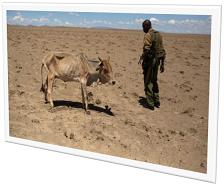Adversity in This Life of Sorrow
Adversity in This Life of Sorrow
A dialogue has started about the providence of God. He provides in all things; he rules and holds everything in his hands. This discussion puts into focus what the church confesses in Lord’s Day 10 of the Heidelberg Catechism. Is it indeed God’s own hand that provides us riches and poverty, health and sickness, etc.? It is not my intent to home in on all sorts of discussions or persons. However, I do believe that some aspects that should have been taken into account in this discussion have not been dealt with adequately. For that reason I would like to add something, without any pretence that this should be the last word.
The title of this article was borrowed from Lord’s Day 9 of the Heidelberg Catechism. In it we confess that God as Father will turn to my good whatever adversity he sends me in this life of sorrow. With “adversity” or evil we understand the suffering of our time: sickness, loneliness, mental problems, physical handicaps, being maimed by accidents, and also our deep sadness with death, either suddenly or after a period of intense suffering.
Is this from God’s hand? He who in his own person is love, does he provide suffering and pain? Does he cause wars and famine? Anyone who has seen the images of emaciated, dying children in zones of famine must have a heart of stone if he does not experience serious difficulty with the agonizing problem of God’s direction in a world full of misery. I won’t even get into the horrible deaths of the millions of Jews who were executed in the concentration camps. Ever since Auschwitz, many people say they can no longer believe in God.
A Sharply Defined Problem⤒🔗
Even though at present many are fearful of “big stories,” at the same time people are not afraid to use strong words. In one of his books the author Maarten ’t Hart dared to compare God to a sadist because apparently he caused throat cancer.
 In an attempt to avoid such a drastic accusation, others are saying, “God too grieves about all that’s happening, and he can’t do anything about it.” However you spin it, all of us are faced with this enigma of evil.
In an attempt to avoid such a drastic accusation, others are saying, “God too grieves about all that’s happening, and he can’t do anything about it.” However you spin it, all of us are faced with this enigma of evil.
We could raise quite a few questions connected to the “problem” of God’s rule of which is spoken in Psalm 73 where the apparent prosperity of the wicked is contrasted to the adversity that believers often suffer. The composer of this psalm exclaimed that it was perplexing to him to understand this, it was a vexation for his eyes.
This explains why nowadays we see a growing number of theologians saying that God, too, is suffering about these problems, and that he is therefore the source of our sympathy (= suffering alongside us). People want to break with the so-called theocratic image of God: the belief that God is the almighty King over all, who provides not only the good, but also the evil. As much as it is found throughout the Bible, this belief represents to them an “intrusion” from the gentile environment. Instead, they want to propose an evangelical image of God; that is, a God who suffers with us, who cries along with us, and with whom we arrive together at death and the resurrection.
Even if one rejects the Biblical criticism that such thoughts entail (heathen ideas worming their way into the Bible!) you’ll still be faced with the dilemma: does God allow and use evil in this life of sorrow?
A Centuries-old Problem←⤒🔗
We should not think that such questions have risen only in this age of “compassion for humanity.” In times before us, many people have struggled with the same questions. They too sought for a solution for their pressing problems.
Today many will say that in the struggle against sickness and death we are actually allies of God and that he takes us seriously as his “partners.” In previous centuries people also presumed that a similar dependency on man was to be found in God. They used to claim that God could not handle it all by himself; he needs man as his ally or co-worker.
 Today such argumentation is followed consistently: God’s hand is not involved with sickness and suffering, and therefore neither in what comes creeping in through all this misery – death. According to this doctrine we can no longer write in our obituaries: “In his time, God took unto himself”! For suffering and death have to do with fate and not with God. We may never “resign” ourselves to it but instead we must rise up against it. God considers it all just as bad as we do and he suffers with us.
Today such argumentation is followed consistently: God’s hand is not involved with sickness and suffering, and therefore neither in what comes creeping in through all this misery – death. According to this doctrine we can no longer write in our obituaries: “In his time, God took unto himself”! For suffering and death have to do with fate and not with God. We may never “resign” ourselves to it but instead we must rise up against it. God considers it all just as bad as we do and he suffers with us.
I have only provided a short illustration of this new thinking about God’s governing of this world. However, on the whole it is clear that the age-old lines of argumentation are extended into our age. What we are facing is an existential problem, with the question as backdrop: what is the relationship between God’s sovereign rule and our responsibility? Let’s be honest and realize that this is a difficult matter that will face each new generation.
We will refrain from expanding further about this, and will point out that often and incorrectly people identify God and man as two partners. When the one partner on earth claims, “I do everything,” the other can say, “Then I don’t need to do anything” – and vice-versa. But that’s not how it is in the relationship between God and man! Man needs to work out his salvation, but it is God who works this in him. Philippians 2:12, 13: “Work out your own salvation … for it is God who works in you, both to will and to work.” In that small word “for” a connection is made that exceeds our understanding. We’re dealing here with the relationship between human responsibility and divine power. God does everything and man is responsible for one hundred percent!
Sickness as Punishment?←⤒🔗
The Bible gives examples of sickness or even death as a direct punishment. Think for instance about the ten plagues in Egypt (Ex. 7–11), boils and death for the Philistines (1 Sam. 5), and the sickness and death in the young Christian congregation of Corinth (1 Cor. 11). The Bible indicates a direct involvement of God. The plagues in Egypt take on cosmic proportions in Revelation 16, when people gnawed their tongues in anguish (vs. 10).
By the same token the Bible teaches that we may not use a reverse reasoning, as if every sickness represents an expression of God’s punishing hand. Jesus shows two examples: a cruel murder of a group of Galileans, and the tower of Siloam crashing down and killing eighteen. He strongly denies that this came about as a result of a specific sin they committed (Luke 13:1-5). Expressly he states that they were no worse offenders than any other people. Of someone who was born blind he lets it be known beyond any doubt that this was not the consequence of a particular sin he had committed (John 9:3).
At the same time, it is remarkable that in this connection the word “sin” is used. There is a connection between sin and sickness. Indeed, there would be no sickness if there were no sin. Ever since the fall there is a rift through all of creation. Immediately after the fall into sin God speaks of hardships and pain, yes, about man returning to dust. In Romans 5:12 we read how death spread to all men because all sinned. We know that in every sickness death is attacking us.
We cannot deny the element of punishment in both sickness and death. However, we may not make a direct connection between every specific sickness and any specific sin. Doing so would be both ruthless and unbiblical.
When Christ took upon himself the punishment of God for our sins, he also bore our griefs and carried our sorrows (Isa. 53:4). The teaching that God could not do anything about it, and that he too suffers as passively as we do, is contrary to the doctrine of the Bible.
We cannot make exceptions either for mental illnesses, simply because man is a unity of body and soul. Would the illness limit itself to the body and leave the spirit untouched?
 The Bible does not give a definition of mental illness, and neither does it do so for physical illnesses. We do read descriptions of both types based on observation. But this does not imply that the Bible is a medical or psychological manual. For example, there is mention of the fever of Peter’s mother (Matt. 8:14), and also of a “crushed spirit” (Prov. 18:14). In both cases there is no evidence of specific sin on the part of the sufferer. Both illnesses are part of the created realm, for man is after all a unity of body and spirit. In that sense we also read in Proverbs 17:22: “A joyful heart is good medicine, but a crushed spirit dries up the bones.”
The Bible does not give a definition of mental illness, and neither does it do so for physical illnesses. We do read descriptions of both types based on observation. But this does not imply that the Bible is a medical or psychological manual. For example, there is mention of the fever of Peter’s mother (Matt. 8:14), and also of a “crushed spirit” (Prov. 18:14). In both cases there is no evidence of specific sin on the part of the sufferer. Both illnesses are part of the created realm, for man is after all a unity of body and spirit. In that sense we also read in Proverbs 17:22: “A joyful heart is good medicine, but a crushed spirit dries up the bones.”
In medical circles there is a growing awareness of the effect of someone’s spiritual condition on his or her physical state. With a dignified word they refer to it as being “psycho-somatic,” and scientifically speaking there is a lot to learn. The practical wisdom of Scripture, however, is ages and ages ahead of such science.
There is of course also dejection on account of unconfessed, concrete sins. Think of Psalm 32:3: “For when I kept silent, my bones wasted away through my groaning all day long.” But just as one cannot say that in the case of bodily sickness – not every sickness is a result of a specific sin–neither is it permissible to turn it around with mental illness: therefore each instance of depression is proof of personal sin. Since the fall into sin, bodily and spiritual structures reveal breakdowns and distortions. This will lead to humility, but then a humility that affects each one of us, whether healthy or sick. This is not a case of a sickly feeling of guilt, but of a believer’s awareness of guilt. How much has been damaged and broken on account of our sin in Adam!
The Mighty Hand of God←⤒🔗
We need to humble ourselves under the mighty hand of God, as Peter writes (1 Peter 5:6). In this context it concerns suffering, shame, and a fiery trial (cf. 4:12). Suffering, shame, and trials! In connection with this the Bible speaks of the mighty hand of God who in his time will also exalt you. In other words, his almighty power and his work are not denied when it comes to sickness and pressure, or to suffering and persecution. On the contrary!
Satan and Sickness←⤒🔗
There is yet more to say about all of this. I direct you to Hebrews 2:14-15 where Satan is mentioned as the one who has the power over death, but who has been dethroned through Christ.
Now, fear of death comes to us through all kinds of sickness. All of medical science is one long struggle against death that threatens us in our diseases. In these, Satan plays his deplorable role.
I am reminded of Christ’s words when a woman came to him who had suffered eighteen years long from a disabling spirit and was bent over (thus, paralysis and deformity): Satan bound her for eighteen years (Luke 13:11, 16). Satan plagues our lives through sickness and disease.
The apostle Paul, who suffered from an unknown disease, ascribes this to “a messenger of Satan” who harassed him (2 Cor. 12:7). Take note: Paul, a servant of Christ, is tortured by Satan.
But it gets even more amazing: Paul has prayed to the Lord – the Kurios, the Almighty – three times to make this messenger of Satan cease. Apparently, Paul does not see Satan as a figure who can act autonomously, but rather as someone who is subjected to God and his Son, also in his actions that cause death and disaster. He operates only under the power of God and his Christ. Christ tells Paul that his grace would be sufficient for him. Yet he is not helped and his thorn is not removed.
We meet something similar in the book of Job. God allows Satan to take everything away from him. He may even inflict him with painful boils, but he was not allowed to kill him. It becomes clear then that Satan is not almighty and that he is and remains under God’s mighty hand. He is not a counter-god. Yes, he is a general, having access to legions of evil spirits called demons. Via such demons he works in sicknesses, which have physical and psychic consequences. It explains why Peter summarizes the work of Christ as follows, “He went about doing good and healing all who were oppressed by the devil, for God was with him” (Acts 10:38). Satan’s aim is death and destruction.
 In doing this he also executes God’s punishment. “God as judge allowed this murderer-of-all to ride on death’s back. Death had now become his servant, and this murderer of the people his legally appointed executioner” (K. Schilder).
In doing this he also executes God’s punishment. “God as judge allowed this murderer-of-all to ride on death’s back. Death had now become his servant, and this murderer of the people his legally appointed executioner” (K. Schilder).
If I may say so, we need to use two words when we speak about all the misery of our world, the disruption of God’s once-so-beautiful creation. We may put it this way: look at Satan wreaking havoc. He is the destroying prince of darkness. He destroys God’s creation and his creatures.
When Satan is sitting on death’s back – and that’s his place after our fall into sin – should I at the occasion of bereavement then say, Satan took from this life so-and-so? Can I no longer say, “The Lord God has taken from this life?” Does Satan get the final word, the final act?
That is why we need to speak with “two words,” because the final word does not belong to the evil one, but to Christ who delivers us from the evil one. He uses the keys of death and hades (Rev. 1:18). As Lord, he governs death.
It does not get any easier as we attempt to justify this with our understanding and logical thinking. Yet it is the teaching of Scripture.
In fact, it all comes into focus at the cross of Christ. He typifies the worst of his suffering as “this is your hour and the power of darkness” (Luke 22:53). Satan grabs his chance and displays his might.
But at the same time our Lord says, “Was it not necessary that the Christ should suffer these things and enter into his glory?” (Luke 24:26). Behind it all we see a divine duty. Yes, he began with Moses and the prophets and interpreted to them in all the Scripture the things concerning himself. The Scripture!
We cannot speak about sickness and death, catastrophes and persecutions, aside from the Scriptures. The hour of darkness was also the hour of light. God – not Satan – has the final word and the eternal power. He is and remains the Almighty!
It is for that reason that there is no comfort at all in the modern theology. Who can comfort the sick and persecuted with remarks such as God is unable to help, he suffers along with you? Can a powerless God comfort us?
No, we don’t have a smooth theory. There are too many “whys” in the psalms, or in our own hearts. We cannot explain all the riddles of life. It isn’t necessary either.
The Bible speaks – especially concerning God who gave us Christ–about the suffering of this present time. It speaks of the groaning of the whole creation, the groaning also of God’s children. Creation was subjected to futility not by its own choice, for then people get the blame. Neither was it through a dark power, for that would give too much honour to Satan. No, it was by the will of God himself that creation was subjected (Rom. 8:20).
 In our everyday lives we are confronted with this futility in a myriad of cases. But this does not make us despair. For in one breath it continues: it was subjected in hope! Creation will be liberated. Not a death-struggle, but the pains of birth, of new life! The redemption of our bodies is in sight, of our limbs and of our spirit. Presently Satan – under God’s permission – can still rage against your limbs and in your spirit. But we know at the same time that both this toilsome life and our death cannot separate us from the love of God!
In our everyday lives we are confronted with this futility in a myriad of cases. But this does not make us despair. For in one breath it continues: it was subjected in hope! Creation will be liberated. Not a death-struggle, but the pains of birth, of new life! The redemption of our bodies is in sight, of our limbs and of our spirit. Presently Satan – under God’s permission – can still rage against your limbs and in your spirit. But we know at the same time that both this toilsome life and our death cannot separate us from the love of God!
I am reminded of the bold confession of the young Christian church of Jerusalem. What did it observe? Herod and Pilate, the Gentiles and the people of Israel that threatened her. Their aim was to persecute, to torture, and to kill. Yet, what did this church say? It was “to do whatever your hand and your plan had predestined to take place” (Acts 4:28)!
Also for today, we need to put shocking and even bewildering events in that light. Satan goes around in great wrath, for his days are numbered. But Christ has conquered. Also in suffering and oppression the will of his heavenly Father is realized. Our last enemy, death with Satan on its back, can only accomplish what God’s hand and counsel had determined beforehand. Even in the seemingly insignificant things: no sparrow will fall to the ground apart from your Father, and the hairs of your head are all numbered (Matt. 10:30). “Underneath are the everlasting arms” (Deut. 33:27).
This article was translated by Wim Kanis.

Add new comment